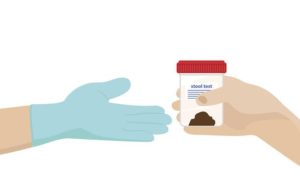6 Things A Fecal Test Can Tell You About Your Health
 People are obsessed with poop. Why does it float? Why do its colors and consistencies vary, and is that normal? (Here are 7 things your poop says about you.) People want to know it all—and now, some are taking it a step further by having their fecal matter tested.
People are obsessed with poop. Why does it float? Why do its colors and consistencies vary, and is that normal? (Here are 7 things your poop says about you.) People want to know it all—and now, some are taking it a step further by having their fecal matter tested.
Gut health is a hot topic right now—hence the explosion of probiotic products—and there are microbiome tests (like the one this writer tried) that can tell you more about the specific microorganisms in your gut. And then there are fecal matter tests (also called stool analysis or stool diagnostic tests) that take a more clinical look at your Number Two.
“You don’t just get a stool analysis for the hell of it,” says Matthew Kalady, MD, a colorectal surgeon at the Cleveland Clinic. “From a screening standpoint, it is used to trigger something irregular for additional investigation and evaluation.”
A few symptoms that could prompt a fecal matter test are blood in your stool, diarrhea, chronic fatigue, or unexplained weight loss. (These 5 diet changes may help you fight chronic fatigue.)
diet changes may help you fight chronic fatigue.)
“The best place to start is with your primary care doctor, who will determine which type of stool test to be ordered,” says Sahil Khanna, MBBS, a gastroenterologist at the Mayo Clinic.
There is no one-stop-shop stool test. Your doctor may order one of many screenings, from a blood or DNA test to a bacterial one. From there, your doctor will point you to a specialist (such as a gastroenterologist) for further treatment options.
Here are six things your poop can tell you about what’s potentially going on in your body:
You could have a parasite.
If you’re experiencing diarrhea, cramping, gas, or recently traveled outside of the United States, you could suspect a parasite (such as Trichinella, Hookworm, or Pinworms). Your doctor will order an ova and parasite test. According to the CDC, stools collected on separate days are needed to determine if a parasite is present and which type. Your poop will be screened for (hold it together) ova, a.k.a. parasite eggs.
You could have hemorrhoids.
Don’t panic! Visible blood in stool doesn’t necessarily mean you have cancer. In fact, it’s more likely that you have hemorrhoids, which are swollen veins in your anus or lower rectum, says Khanna. Bleeding during a bowel movement is the most common sign of hemorrhoids, but your doctor can confirm that you have them by doing a physical exam or test.
You could have inflammatory bowel disease.
If you struggle with bad abdominal pain, cramping, chronic fatigue, and rectal bleeding, you may have inflammatory bowel disease (IBD). IBD includes Crohn’s disease and ulcerative colitis. Stool tests will be done for these to look for signs of inflammation, says Khanna, specifically the presence of calprotectin and lactoferrin, proteins in the stool that signal inflammation.
You could have vitamin deficiencies.
In particular, smelly stool may cause you to look in the toilet, and you may notice fat in your stool. The medical term for this, steatorrhea, means your body isn’t digesting and absorbing fats properly and could signal pancreatic or intestinal disorders.
In particular, your body may not be absorbing vitamins A, D, and K, which are all fat-soluble vitamins, says Khanna. To diagnose, your doctor will order a fecal fat test, which requires a high-fat diet over a 72-hour period to test fat levels in the stool.
You could have an ulcer.
Blood in your poop could also mean you have a stomach ulcer, which is most commonly caused by a bacterial infection, according to the Mayo Clinic. Your doctor will order a fecal test to determine if the bacteria, called H. pylori, is present in your stool.
You could have colon cancer.
Blood in your stool is a red-flag symptom of colon cancer, but the blood can be visible or invisible (the kind you can’t see is called occult blood), making colon cancer difficult to determine.
“The gold standard (in colon cancer screenings) is colonoscopies,” says Kalady. However, new non-invasive and at-home colon cancer screening tests have hit the market in recent years. Cologuard Colon Cancer Fecal Test is the first and only FDA-approved stool DNA test that can be done at home (but prescribed by a doctor), and is over 90% effective in detecting colon cancer.
For early detection, the American Cancer Society advises men and women to get screened for colon cancer starting at age 50. However, if you have a family history of colon cancer, you should begin screenings 10 years younger than the age your relative was diagnosed, says Khanna.
[…]






